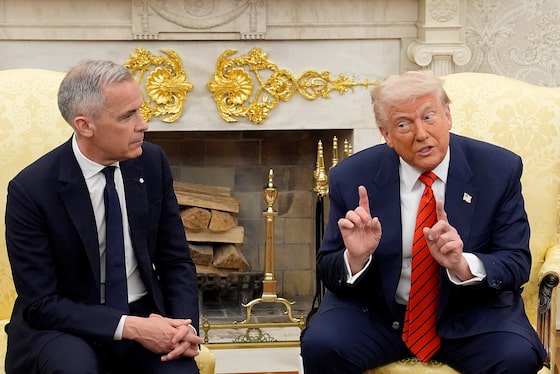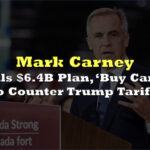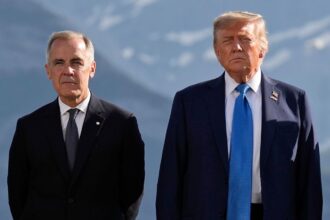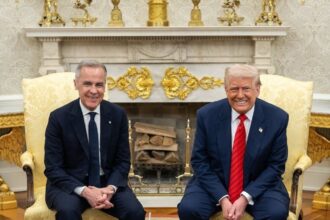The winds of economic protectionism are once again gusting across North America, and Canada finds itself in an increasingly precarious position. As former Bank of Canada governor Mark Carney recently warned, our nation needs to urgently reassess its approach to free trade—a sentiment that couldn’t come at a more critical moment for our economic future.
For decades, Canada has positioned itself as a champion of global free trade, eagerly signing agreements and lowering barriers. This approach served us well in a world that seemed to be moving inexorably toward greater economic integration. But that world is rapidly changing. The United States, our largest trading partner, has embraced a new economic nationalism that transcends partisan lines, while Europe and Asia pursue their own forms of strategic protectionism.
“We’re at an inflection point,” Carney stated bluntly at a recent economic forum in Montreal. His assessment echoes through corporate boardrooms and policy circles across the country. The fundamental question facing Canada isn’t whether free trade remains theoretically beneficial—it’s whether our current approach remains viable in a world where our trading partners are increasingly playing by different rules.
The numbers tell a sobering story. Nearly 75% of our exports still flow to the United States, creating a dependency that becomes increasingly problematic as America shifts toward protecting its domestic industries. The renegotiation of NAFTA into the USMCA served as an early warning shot, but potentially more significant challenges loom on the horizon, particularly in critical sectors like automotive manufacturing, agriculture, and increasingly, clean technology.
What makes Canada’s position particularly challenging is our relative lack of economic leverage. When the United States or European Union implement protectionist measures, they do so from positions of considerable market power. Canada, with its modest population of 40 million, simply doesn’t command the same economic gravity, making reciprocal measures less effective as negotiating tools.
This reality demands a fundamental rethinking of our approach. Rather than clinging to pure free trade idealism, Canada needs to develop what economists increasingly call “strategic trade policy”—a more nuanced approach that preserves the benefits of trade while protecting vital national interests and securing greater resilience.
This doesn’t mean abandoning free trade principles entirely. Rather, it requires developing more sophisticated approaches that recognize the changing global landscape. For instance, Canada could focus on developing deeper supply chain integration with like-minded partners in sectors of strategic importance, reducing vulnerability to political shifts in any single market.
Similarly, we might need to more aggressively support critical domestic industries, particularly those tied to national security, energy transition, or food sovereignty. The traditional argument that such support distorts markets remains theoretically sound, but appears increasingly naive in a world where our major trading partners are already providing substantial support to their domestic champions.
“We need to be clear-eyed about where the world is heading, not where we wish it would go,” notes University of Toronto economist Patricia Rowan. “Canada has historically benefited enormously from the rules-based trading system, which is precisely why we should be concerned about its erosion and prepare accordingly.”
The cultural dimensions of this shift should not be underestimated. For generations, Canadians have defined themselves partly in opposition to American protectionism, seeing our openness to trade as a marker of our more internationally-minded outlook. Pivoting toward a more strategic approach will require not just policy changes but a recalibration of our national self-perception.
Some critics will inevitably view any move away from pure free trade principles as a capitulation to populism or economic nationalism. But this perspective misreads the moment. Strategic trade policy isn’t about rejecting global economic integration—it’s about ensuring that integration happens on terms that serve our national interests and reflect the actual behavior of our trading partners.
As the global economy fragments into increasingly distinct regional spheres of influence, Canada faces difficult choices. Do we primarily align ourselves with the North American economic zone, deepen ties with Europe, or pursue greater integration with fast-growing Asian economies? Each path carries both opportunities and risks that demand careful consideration.
What seems increasingly clear is that continuing with business as usual is not a viable option. The free trade consensus that has guided Canadian economic policy for generations is eroding, not because the theoretical arguments for trade have weakened, but because the practical reality of how our partners approach trade has fundamentally changed.
The question now isn’t whether Canada should adapt its approach to trade, but how quickly and in what direction. Our economic prosperity in the coming decades may well depend on getting that answer right.
























